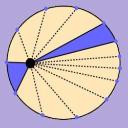Yahoo Answers is shutting down on May 4th, 2021 (Eastern Time) and beginning April 20th, 2021 (Eastern Time) the Yahoo Answers website will be in read-only mode. There will be no changes to other Yahoo properties or services, or your Yahoo account. You can find more information about the Yahoo Answers shutdown and how to download your data on this help page.
Trending News
Is 1 a prime number?
A prime number is defined as a number that has exactly two factors. These factors are 1 and itself.
So does 1 fit the definition or not? It has a factor of 1 but it also has a factor of 1 that you could consider is itself. And that factor is 1. But then is that factor of 1 that is 1 just a factor or itself?
*whimpers*
*runs around in little circles*
18 Answers
- 1 decade agoFavorite Answer
Actually pre 19th centuary 1 was considerd to be a prime. The work of Stern and Zeisel for example is still considerd valid even though they lableld 1 a prime number. Derrick Normal Lehmer's list of prime numbers up to 10,006,721 was printed up to 1956 and started with 1 been a prime number. Henri Lebesgue is suposedly the last professional mathmatitian to call 1 a prime number.
The change was due the "Fundamental theorem of arithmetic" or "unique-prime-factorization theorem" which states: "every natural number greater than 1 can be written as a unique product of prime numbers" or "each number has a unique factorization into primes"
Source(s): http://www.nationmaster.com/encyclopedia/Moritz-Ab... http://www.smartcomputing.com/editorial/dictionary... http://en.wikipedia.org/wiki/Fundamental_theorem_o... http://primes.utm.edu/notes/faq/one.html http://www.geocities.com/primefan/Prime1ProCon.htm... - 1 decade ago
1 is not a prime number since prime number starts with 2 and 1 was an exception while making the definition of Prime numbers ...so in order to decide whether 1 follows definition of prime numbers or not it does..not requires a check at all
- Steven CLv 41 decade ago
This is a matter of some debate...
A prime number is a number which has only two factors, 1, and itself. But in the case of 1, there is only one factor: 1.
There are lots of patterns and relationships that involve prime numbers, but many of these fail for one, if it is counted as prime. This makes some of the relationships must less neat to write. Instead of: "for all primes ...", it must be rewritten: "for all primes except one ...".
For example if 2^n - 1 is prime, then 2^(n-1) * (2^n - 1) is perfect. But for n = 1 then 2^1 - 1 = 1, but 2^(1 - 1) * 1 = 1 which is not perfect, because the sum of the proper factors of 1 is zero (1 has no proper factors because 1 is not counted as a proper factor).
Counting 1 as a prime means that numbers can no longer be written as a unique product of primes. For example:
9 = 3 * 3 = 3 * 3 * 1 = 3 * 3 * 1 * 1..., and so on.
Another thing to note is that using the Sieve of Eratosthenes to generate prime numbers. If one was selected as the first prime number, then ever subsequent number would be crossed out, leaving the only prime number as 1. http://en.wikipedia.org/wiki/Sieve_of_Erastothenes
For these reasons most mathematicians do not count 1 as a prime number.
- How do you think about the answers? You can sign in to vote the answer.
- 7 years ago
Thanks for that; a logical and useful answer. I've been fobbed off with:
"The number 1 is not a prime number because according to the definition it does not qualify. This is because a prime number is an integer that is greater than 1 and has positive factors that are one and itself."
But that's a circular argument - "one doesn't fit the definition because the definition excludes one".
I was taught Maths in the early 1960s, and I'm pretty sure I was taught that one was prime; if so, either the teacher had been taught the same (possibly), or he couldn't be bothered to go into the details!
- 1 decade ago
By definition NOT. A prime number is a number that can only be divided by 1 and itself, which are 2 numbers. In the case of 1, there is only 1 number, '1'. So it's not a prime number.
- gudspelingLv 71 decade ago
Prime numbers, by definition, have two factors. 1 has only one factor. Hence one is not a prime number. This does NOT make 1 a composite number.
- KeplJoeyLv 71 decade ago
1 is not a prime number as it does not have exactly two factors. It only has one factor, and that is 1 itself.
Since it is not true that 1 factor = 2 factors (as 1=/=2) 1 is not a prime.
- 7 years ago
1 can not be a prime number as if its added to prime numbers list, then all other prime numbers will be divisible by one and will be vanished from the prime numbers list. Thats wat I feel after going through many answers and approaches. Off course its debatable.





